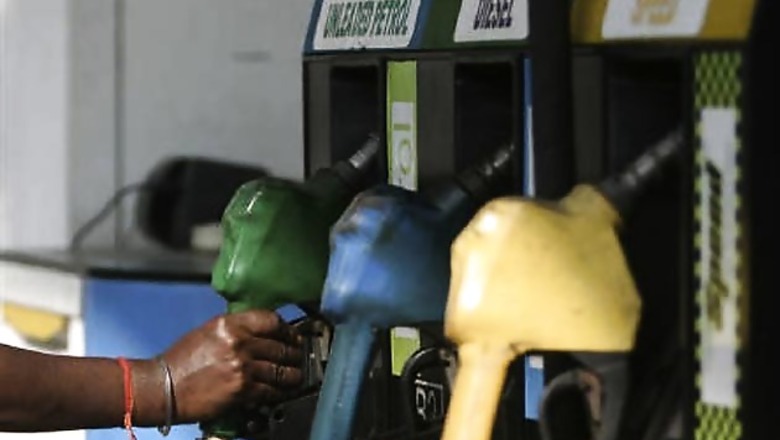
views
New Delhi: The government on Friday freed up state-subsidised petrol prices and hiked other fuels as high global oil prices and pressure to trim the budget deficit outweighed concerns about the political impact of the measures.
A panel of ministers increased prices of state-subsidised diesel, kerosene and cooking gas prices, which could help reduce the fiscal deficit from the projected 5.5 percent of 2010/11 GDP and free up revenues for other programmes.
The panel said petrol prices would be market driven, rising 3.50 rupees per litre, while kerosene prices would rise by 3 rupees a litre. While petrol is mainly used by the middle class for cars, kerosene is used by the poor for power.
Diesel prices will rise 2 rupees per litre and will be freed up in the future. Cooking gas prices were raised by 35 rupees a cylinder.
"It was decided that the price of petrol will be market determined both at the refinery gate and at the retail level," Oil Secretary S. Sundareshan told reporters.
India's benchmark bond yield rose 2 basis points immediately after the news on concerns that the hikes would push up inflation.
The benchmark 5-year swap rate rose 1 basis point to 6.74 percent while the 1-year swap rate rose 2 basis points to 5.50 percent. Shares in Indian oil firms rose more than 3 percent on the news.
In early June, the Congress-led government held off the decision after two powerful ministers from coalition parties stayed away from a ministerial panel meeting, signalling opposition to the move on fears of voter backlash.
Finance Secretary Ashok Chawla told Reuters this month he expects the fiscal deficit to shrink to 4.5 percent of GDP in fiscal year 2011 if fuel prices are deregulated and on the back of other revenues including the 3G spectrum auction.
Fuel accounts for a quarter of its estimated subsidy bill of 1.2 trillion rupees ($25.5 billion). Before Friday's announcement, projected losses for oil firms are estimated at $24.4 billion this year, based on an average crude price of $85 a barrel.
Congress was handed a second term in office last year on the back of the ruling party's pledge to share the spoils of years of economic boom and protect hundreds of millions living below the poverty line. The government backed out a few months ago on freeing up farm prices after street protests.
Asia's third-largest economy has been eyeing new ways to reduce subsidies since the failure of its 2002 attempt to get state-owned refiners to fix prices every two weeks in step with global rates.
Rival Asian giant China by contrast abandoned similar fuel price subsidies from January 2009 to great effect for then-struggling refiners grappling with losses, as Indian state-owned refiners do now.
Inflationary pressures
Raising fuel prices would stoke inflationary pressures, already at levels uncomfortable enough for voters to slam Congress in recent municipal elections in West Bengal.
India's food inflation accelerated in mid-June and further inflationary pressures could lead the central bank to raise interest rates ahead of a July 27 policy review.
"Yes, a rise in petrol and diesel prices will be reflected in the fuel inflation numbers and there will also be second-rung impacts reflected in transport costs, etc," said Atsi Sheth, chief economist at Macro-Sutra in Mumbai.
"The fiscal implications, too, regarding the subsidy bill, are positive. On the monetary front, I don't see the Reserve Bank of India (RBI) reacting to this as an immediate trigger."
"Global commodity prices, even before this hike, have been contributing to high inflation and the RBI will, therefore, consider all these factors and will not react solely to this decision," he added.
Any move to remove price controls will help Reliance Industries, which operates the world's biggest refining complex but exports most products as the local market is dominated by state firms that sell cheap fuel, helped by government subsidies.
Finance Minister Pranab Mukherjee said earlier this week he believed a strong harvest following a normal monsoon would tame food prices.
Indian farm ministry officials on Friday gave their most optimistic forecast yet for the annual rains -- which irrigate 60 percent of the country's farms -- saying the June-September rainfall would likely be 102 percent of the long-term average.
(With inputs from Agencies)













Comments
0 comment